Related Research Articles

Mohammad Reza Rahimi is an Iranian politician who served as the fifth first vice president from 13 September 2009 until 3 August 2013. His previous posts included governor of the Kurdistan province and vice president for parliamentary affairs.

Mahmoud Ahmadinejad, born Mahmoud Sabbaghian on 28 October 1956, is an Iranian principlist and nationalist politician who served as the sixth president of Iran from 2005 to 2013. He is currently a member of the Expediency Discernment Council. He was known for his hardline views and nuclearisation of Iran. He was also the main political leader of the Alliance of Builders of Islamic Iran, a coalition of conservative political groups in the country, and served as mayor of Tehran from 2003 to 2005, reversing many of his predecessor's reforms.
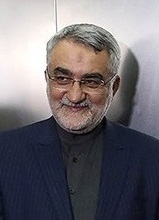
Alaeddin Boroujerdi was a member of the Iranian parliament and former Chairman for the Committee for Foreign Policy and National Security of the Islamic Consultative Assembly of Iran.
New Kabul Bank is a bank in Afghanistan that has its main branch in the capital city of Kabul. It was established in 2004 as the Kabul Bank, the first private bank in Afghanistan. After corruption and scandals it was re-established in 2011 as the New Kabul Bank.
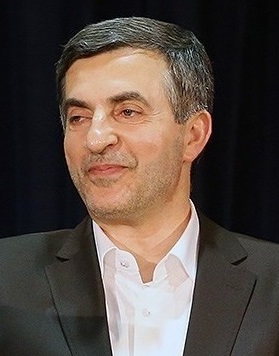
Esfandiar Rahim Mashaei is an Iranian conservative politician and former intelligence officer. As a senior Cabinet member in the administration of President Mahmoud Ahmadinejad, he served as Chief of Staff from 2009 to 2013, and served as the fourth first vice president of Iran for one week in 2009 until his resignation was ordered by Supreme Leader Ayatollah Ali Khamenei.

Corruption is a serious problem in Iran, being widespread, mostly in the government. Reformists and conservatives alike – routinely criticize corruption in the government.
Events in the year 2009 in the Islamic Republic of Iran.
Events in the year 2011 in the Islamic Republic of Iran.
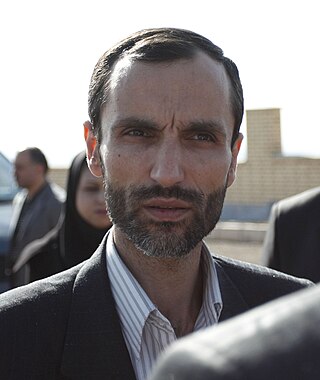
Hamid Baghaei is an Iranian conservative politician and former intelligence officer who is considered one of Mahmoud Ahmadinejad's closest confidants. He first entered the administration in 2006 as deputy of Esfandiar Rahim Mashaei in the Cultural Heritage, Handcrafts and Tourism Organization. In 2011, he simultaneously held the position of vice president in charge of executive affairs and supervised the presidential administration.
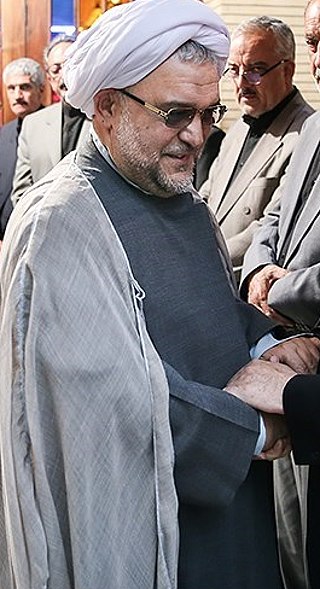
Hojjatoleslam Abbas Amirifar is the prayer leader of Iranian president Mahmoud Ahmadinejad and head of the presidential cultural committee. He was arrested in May 2011 on charges of "sorcery", after he produced a controversial film predicting the imminent return of the Mahdi,. According to Radio Zamaneh, he was "referred to the Special Court for the Clergy for his involvement in the production and distribution" of the film, as well as for "disturbing public minds and insulting political groups and figures." The arrest is thought to be part of a dispute between the president and other conservatives, including the supreme leader. "At least 25" supporters of Ahmadinejad have been arrested in 2011, including Mohammed Sharif Malekzadeh and Kazem Kiapasha.
Mahafarid Amir Khosravi, also known as Amir Mansour Aria, was an Iranian businessman who was executed for his part in the 2011 Iranian embezzlement scandal. At one time, he was considered the richest man in Iran. An assessment made in April 2012 suggested he would rank as 290th among Forbes' richest people in the world if included on the list.

Monotheism and Justice Front: Supporters of the Government was an Iranian conservative electoral list for the 2012 legislative election. They were linked to Esfandiar Rahim Mashaei and Mahmoud Ahmadinejad.
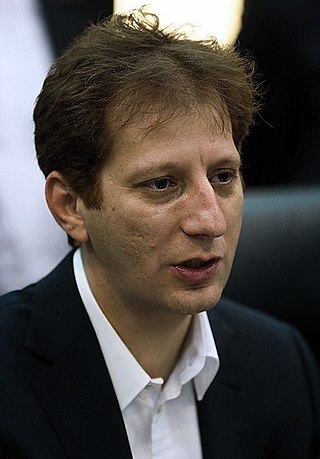
Babak Zanjani is an Iranian billionaire and business magnate. He was the managing director of the UAE-based Sorinet Group, one of Iran's largest business conglomerates. In late 2013, he was arrested and accused of withholding $2.7 billion of government money owned by the Ministry of Petroleum, while facilitating Iran's oil revenue, which was hindered by the sanctions against Iran.

Valiollah Seif is an Iranian banker. He was the governor of the Central Bank of Iran from 2013 until 2018.
Events in the year 2014 in the Islamic Republic of Iran.
Mahmoud Reza Khavari is a former Iranian banker, businessman, and fugitive embezzler who was involved in the 2011 Iranian embezzlement scandal. In 2005, he became a Canadian citizen. He is a fugitive wanted by the judicial authorities of Islamic Republic of Iran, and as of October 2016, Khavari was wanted by Interpol.
The Fatemi Circle is a nickname given to a clique of statesmen within the Government of Mahmoud Ahmadinejad, reported to have been involved in numerous corruption scandals in Iran.

The Coalition of the Pleasant Scent of Servitude, the Sweet Scent of Servitude or the Joyful Essence of Obedience was a conservative political group in Iran that supported Mahmoud Ahmadinejad and his government.
Supporters of Justice Discourse of Islamic Revolution was a principlist electoral list for 2012 Iranian legislative election, allegedly close to Esfandiar Rahim Mashaei. The group supported Government of Mahmoud Ahmadinejad (2005–13). Their list in Tehran, had an overlap with Front of Islamic Revolution Stability. News website Goftemannews.com is linked to the group they were said to be trying to publish a newspaper called Mehr Adalat.
The "deviant current" or "current of deviation" is a term used by Iranian officials and conservative rivals of Mahmoud Ahmadinejad to describe Ahmadinejad's entourage which functions like a faction or party. Ahmadinejad had some tendency toward Iranian nationalism which deviated from the clerics' theocratic rule, hence top clerics labeled the faction associated with him as "deviant current".
References
- 1 2 3 4 Iran Makes New Arrests in Fraud Case. Rick Gladstone. The New York Times 25 October 2011
- 1 2 3 4 5 Iran's supreme leader calls for ‘cutting traitorous hands' in huge bank scam [ dead link ]. Associated Press,. The Washington Post (3 October 2011)
- 1 2 "Iran Accuses Businessman of Bank Fraud". Associated Press. The New York Times (12 September 2011)
- 1 2 "Iran: Banker's Return Sought in Bank Scandal". The New York Times (29 September 2011)
- ↑ "Main Suspects Arrested in Iran Bank Embezzlement". Farsnews. Archived from the original on 29 March 2012. Retrieved 20 September 2011.
- ↑ "Banker in Iran scandal said to be in Toronto".
- ↑ "Iran: Former Chief of a Major bank, Accused in Embezzlement Scandal".
- 1 2 "Iran billionaire executed over $2.6B bank fraud". USA Today. Associated Press. 24 May 2014. Retrieved 24 May 2014.
- ↑ "The Iranian Billionaire Involved In The 2011 Embezzlement Scandal Was Executed Saturday, Here's Why ".
- ↑ "Four sentenced to death over $2.6bn Iran bank fraud".
- ↑ "Iran sentences fugitive ex-bank chief to jail over $2.6bn embezzlement scandal".
- ↑ "Embezzlement in Iran is 'intolerable scandal'". 19 September 2011. Archived from the original on 6 September 2012. Retrieved 20 September 2011.
- ↑ "Analysis: Iran's biggest financial scam weakens Ahmadinejad".
- ↑ "Death terms in Iran bank scandal".
- ↑ "Iranian parliament meets over embezzlement scandal, vows to pursue corruption". China Daily. Archived from the original on 10 October 2011. Retrieved 20 September 2011.
- ↑ "Epic bank scandal investigation hits Ahmadinejad".